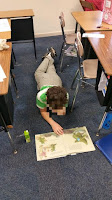But if you're like me, a little part of your teacher brain is still working ahead, thinking about everything you need (or want) to do before things start back up.
So, if you're up late at night thinking about what you need to do, let me give you a short little list of things that I use frequently in my classroom that you might want to think about.
(These are all links to my TpT store, The Owl Spot.)
1. Daily Review
Whether you're teaching ELA or Math, daily review is necessary for students to practice and master their skills. Here are a few links that will help you with this!
ELA Bellwork for Upper Elementary Grades
*** Both of these can be used digitally or printed for your students. The daily structure helps your students review key, grade level (and some review) skills to keep their understanding fresh all year! Super easy to use!
ELA Bellwork for Grades 2-3
Math Word Problems - 180 problems to use all year!
*** These are perfect for grades 3-4! Simple word problems. A Daily Word Problems for grades 4-5 is coming soon! These will focus more on multi-stepped and higher math skills.
2. Poetry
If you struggle to teach poetry, know that you are not alone! While poetry isn't a huge focus in the elementary grades, it's still an important concept to teach. Most (if not all) state and national testing have poetry questions. And if taught in small chunks throughout the year, this could be an area that your students can excel in. Also, teaching and reading poetry frequently helps with reading fluency, so it's a win/win for everyone! Here's some tools that will be a perfect addition for you this year.
Daily Poetry for Upper Elementary Grades (10 Minute Poetry Lessons)
Daily Poetry for Grades 2-3 (10 Minute Poetry Lessons)
*** These can both be used digitally or in a printed format. Simple to follow teacher steps for teaching poetry. Don't miss out!
Elementary Poetry Lessons Bundle
** If you want to dive a little deeper into the poetry lessons that are in the Upper Elementary Grades product, this BUNDLE is ESSENTIAL! Extended lessons are included (along with your instructions). Perfect to use all year - also perfect for SUB PLANS!
3. Vocabulary
Vocabulary is an important part of any reading program. I've always been disappointed with the little available instruction in my curriculum. So, I created this AMAZING set of lessons that I've used in my classroom and have seen my students' knowledge of words, synonyms, and comprehension increase.
Each lesson focuses on learning synonyms for new words, understanding and practice using tools (digital or hard copies of dictionaries - I gave a link to an online dictionary, but it's your choice), and then transferring their new word knowledge to sentence revisions and reading comprehension in texts. This is listed as a 4th grade resource, but I used it with my 5th graders to "catch them up." It can easily be used with 3rd grade as well. The link takes you to the Full Year Bundle, but you can also see details for each quarter.
4. Classroom Decor
Now, this is the fun stuff! I like to change up my decorations/theme every year or 2, so I'm always looking for something that's fun. There's also some great classroom posters below, too. Here's some items you may want to check out!
So, please enjoy relaxing and getting all of your summer bucket list done. When you're ready to start thinking about August, make sure to take a look at some of these things. I promise they will make your year easier!



















